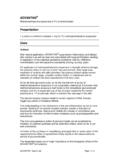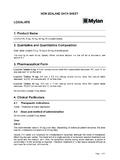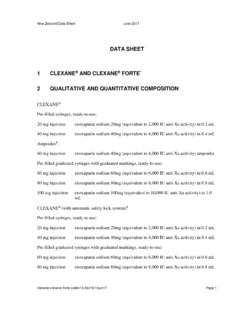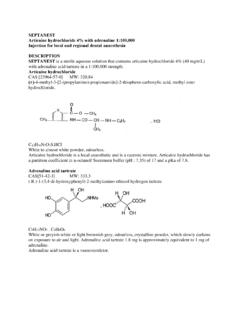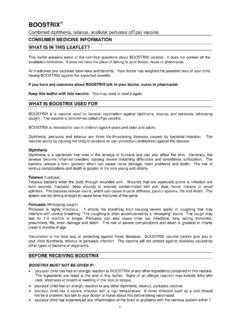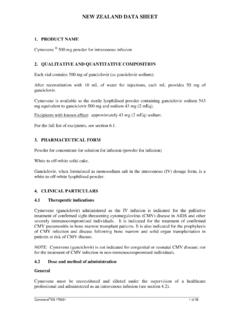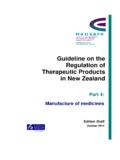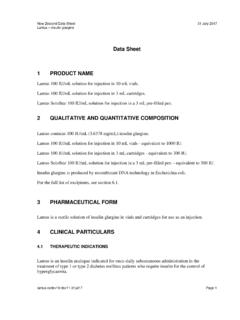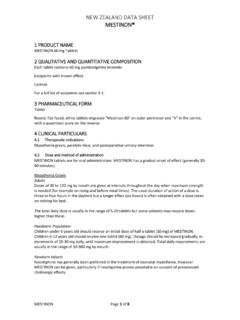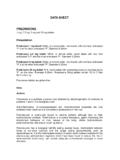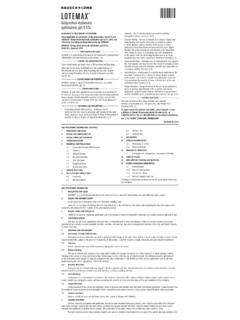Transcription of NEW ZEALAND DATA SHEET - Medsafe
1 DEXMETHSONE dexamethasone mg & 4 mg - data SHEET Page 1 of 8 NEW ZEALAND DATA SHEET 1. PRODUCT NAME DEXMETHSONE dexamethasone mg tablet. DEXMETHSONE dexamethasone 4 mg tablet. 2. QUALITATIVE AND QUANTITATIVE COMPOSITION Each tablet contains either dexamethasone mg or 4 mg. Excipients with known effect: lactose monohydrate and wheat starch ( mg tablet only). For the list of excipients, see section 3. PHARMACEUTICAL FORM mg: Round, slightly biconvex white tablets plain on one side and ' ' with breakline on the other side. 4 mg: Round, white tablets plain on one side and 'DS/4' with breakline on the other side.
2 4. CLINICAL PARTICULARS Therapeutic indications Dexamethasone is indicated for replacement therapy in secondary adrenal insufficiency arising from insufficient corticotrophin secretion. It is not indicated for primary adrenal insufficiency states, such as Addison s disease or after adrenalectomy. In such cases hydrocortisone and fludrocortisone in combination is more appropriate. Dexamethasone is also indicated for allergic disorders such as bronchial asthma and allergic skin reactions, blood disorders such as leukaemia, thrombocytopoenia and haemolytic anaemias, selected collagen and rheumatic disorders (only rarely in rheumatoid arthritis), gastrointestinal disorders such as inflammatory bowel disease, connective tissue disorders such as arteritis, systemic lupus erythematosus (but not scleroderma), some skin diseases such as pemphigus, oedema, some eye disorders, certain neoplastic disorders such as cerebral neoplasm, secondary hypercalcaemia, and acute leukaemia in children.
3 It may also be used to prevent neonatal respiratory distress syndrome and in the diagnosis of Cushing's syndrome. Dose and method of administration The dose of dexamethasone varies according to the condition being treated. The tablets are for oral administration in a dose of 4 mg-20 mg daily. The duration of therapy is dependent on the clinical response of the patient and as soon as improvement is indicated, the dosage should be adjusted to the minimum required to maintain the desired response. Withdrawal of dexamethasone at completion of treatment should be gradual. DEXMETHSONE dexamethasone mg & 4 mg - data SHEET Page 2 of 8 Contraindications Hypersensitivity to any ingredient Systemic infections unless specific anti-infective therapy is given Live virus immunisation Special warnings and precautions for use Caution is necessary when oral corticosteroids are used in patients with the following conditions and frequent monitoring is necessary.
4 Hypertension Hypothyroidism Congestive Heart failure or recent myocardial infarction Liver failure Renal insufficiency Diabetes mellitus or in those with a family history of diabetes Osteoporosis Glaucoma Patients with a history of severe affective disorders particularly of steroid induced psychoses Epilepsy and/or seizure disorder Peptic ulceration Previous steroid myopathy Tuberculosis Patients with myasthenia gravis receiving anticholinesterase therapy since corticosteroid use may decrease plasma anticholinesterase activity Patients with thromboembolic disorders Patients with Duchenne s muscular dystrophy since transient rhabdomyolysis and myoblobinuria have been reported following strenuous physical activity Patients with Cushing s disease.
5 Adrenocortical insufficiency Pharmacologic doses of corticosteroids administered for prolonged periods may result in hypothalamic-pituitary-adrenal (HPA) suppression (secondary adrenocortical insufficiency). The degree and duration of adrenocortical insufficiency produced is variable among patients and depends on the dose, frequency, time of administration and duration of therapy. Symptoms of adrenal insufficiency include: malaise, muscle weakness, mental changes, muscle and joint pain, desquamation of the skin, dyspnoea, anorexia, nausea and vomiting, fever, hypoglycaemia, hypotension and dehydration. During prolonged courses of corticosteroid therapy sodium intake may need to be reduced and calcium and potassium supplements may be necessary.
6 Monitoring of fluid intake and output and daily weight records may give an early warning of fluid retention. Acute adrenal insufficiency leading to a fatal outcome may occur if glucocorticoids are withdrawn abruptly, therefore withdrawal of corticosteroids should always be gradual. A degree of adrenal insufficiency may persist for 6 to 12 months; therefore in any situation of stress occurring during that period steroid therapy may need to be reinstituted. Since mineralocorticoid secretion may be impaired treatment with salt and/or a mineralocorticoid may also be needed. During prolonged therapy, any intercurrent illness, trauma or surgical procedure will require a temporary increase in dosage.
7 Antiinflammatory/ Immunosuppressive effects and Infection Suppression of the inflammatory response and immune function increases susceptibility to DEXMETHSONE dexamethasone mg & 4 mg - data SHEET Page 3 of 8 infections and their severity. The clinical presentation may often be atypical and serious infections such as septicaemia and tuberculosis may be masked and may reach an advanced stage before being recognized when corticosteroids are used. The immunosuppressive effects of glucocorticoids may result in activation of latent infection or exacerbation of intercurrent infections. Chickenpox is of particular concern since this may be fatal in immunosuppressed patients.
8 Patients without a definite history of chickenpox should be advised to avoid close personal contact with chickenpox or herpes zoster and if exposed they should seek urgent medical attention. Passive immunization is recommended for non-immune patients who do come into contact with chickenpox. If a diagnosis of chickenpox is confirmed the illness warrants specialist care and urgent treatment. Live vaccines are contraindicated in individuals on high doses of corticosteroids and should be postponed until at least 3 months after stopping corticosteroid therapy. Ocular effects Prolonged use of corticosteroids may produce subcapsular cataracts and nuclear cataracts (particularly in children), exophthalmos or increased intraocular pressure, which may result in glaucoma with possible damage to the optic nerves.
9 Corticosteroids should only be initiated in patients with ocular herpes simplex with appropriate viral cover by ophthalmologists because of the risk of corneal scaring, loss of vision and corneal perforation. Psychiatric effects Patients and/or carers should be warned that potentially severe psychiatric reactions may occur. Symptoms typically emerge within a few days or weeks of starting treatment. Most reactions recover after either dose reduction or withdrawal, although specific treatment may be necessary. Patients and/or carers should be encouraged to seek medical advice if worrying psychological symptoms develop, especially if depressed mood or suicidal ideation is suspected.
10 Particular care is required when considering the use of corticosteroids in patients with existing or previous history of severe affective disorders. Psychic derangements range from euphoria, insomnia, mood swings, personality changes and severe depression to frank psychotic manifestations. Use in children Corticosteroids cause growth retardation in infancy, childhood and adolescence, which may be irreversible and therefore long-term administration of pharmacological doses should be avoided. If prolonged therapy is necessary, treatment should be limited to the minimum suppression of the hypothalamo-pituitary adrenal axis and growth retardation, the growth and development of infants and children should be closely monitored.
